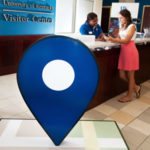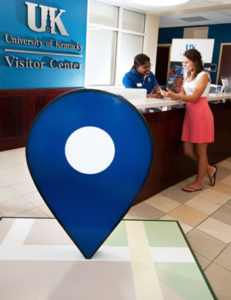
The University of Kentucky, if all goes according to the campus’s marketing plan, could pop up in 1.3 million Facebook news feeds during the fall semester—and students might just learn something about maintaining online privacy in the process.
The Lexington, Ky., university placed six-foot wooden Facebook Places logos in six campus locations with the heaviest foot traffic to encourage students to “check in” using Facebook’s geo-tagging application, which lets users show friends where they are—the campus library, for instance.
Places, which is similar to geo-tagging services Yelp, Gowalla, Booyah, and Foursquare, launched in August and drew skeptical reviews from many in higher education. Facebook users must opt into Places before the application displays the person’s location.
Kentucky’s Facebook Places push began when students returned from summer break in the first week of September. Officials said their goals were to educate students by guiding them to a university web site that preaches caution while using social media applications like Places, and boosting Kentucky’s presence in Facebook frequenters’ news feeds.
David Coomer, director of interactive services at Cornett-IMS—the advertising agency that helped the university launch the Places program—said that if the campaign can spur 10,000 check-ins this semester, Kentucky could appear in 1.3 million Facebook news feeds, because each Facebook user has an average of 130 friends who can track his or her updates.
“We would like this to really have a viral marketing element … and we knew a brochure wouldn’t lead to 10,000 check-ins,” said Coomer, adding that Places would become a “household name” within six months. “It’s a great value for the university from a marketing standpoint.”
“I don’t expect every friend to see or act on every piece of shared content on Facebook,” but having students share their location with online friends they presumably trust will prove more effective than an “all-display” ad campaign, he said.
The university’s Facebook Places web site includes video tutorials on how to use the geo-tagging application, and how to adjust privacy settings so only certain friends can see your check-in in their news feed.
The web page tells students that “Facebook Places will help you share and find the hot spots on campus” and that they “should be used responsibly, and users should consider privacy and safety issues” before they check in on their smart phones.
Caitlin Fitzsimmons, a digital media expert who has tracked Kentucky’s Facebook Places ad campaign since it was launched at the start of the fall semester, said the initiative can have some educational value if school officials push safety tips along with their encouragement to check in around campus.
“They need to make sure they’re not inadvertently putting students in potentially dangerous situations,” said Fitzsimmons, who wrote a Sept. 7 blog post on the school’s Places plan. “There needs to be more education on the topic than people might expect. When you’re 18, you might think nothing bad can ever happen, but things do happen, and sometimes they’re caused by really innocent behaviors [like using social media]. … [The university] needs to help students exercise a bit of caution.”
She added: “I would think that the main purpose is marketing the university, and I don’t think there’s anything wrong with that.”
Privacy advocates, social media consultants, and some in higher education said expanding geo-tagging services could pose security risks to students with Facebook accounts.
Shel Israel, author of two books on social media and a social media consultant to businesses and corporations, credited Facebook for making Places an “opt-in” feature. But a student who allows a large Facebook community of friends to track his or her foray through a local downtown area could be inviting trouble.
“That’s a red flag of danger, and messages like that go up all the time,” said Israel, whose latest book, Twitterville, hit bookshelves in September 2009. “It can create dangers that need to be remedied.”
The American Civil Liberties Union of Northern California released a statement just hours after Facebook Places was unveiled, criticizing the company for making it easy to opt in to the application, while a member would have to delve into his or her Facebook privacy controls to opt out of the program.
“Places allows your friends to tag you when they check in somewhere, and Facebook makes it very easy to say ‘yes’ to allowing your friends to check in for you,” the statement said. “But when it comes to opting out of that feature, you are only given a ‘not now’ option (a.k.a. ask me again later).”
Coomer said the large wooden Facebook Places logos wouldn’t be a mainstay on the Lexington campus. They might not even survive a big sporting event.
If the Kentucky basketball or football teams pull off a big win and spark a rowdy celebration, “they will probably all be ripped to pieces, and that’s the give and take I guess,” Coomer said. “We’re not looking for those to be there forever.”
- Research: Social media has negative impact on academic performance - April 2, 2020
- Number 1: Social media has negative impact on academic performance - December 31, 2014
- 6 reasons campus networks must change - September 30, 2014

Comments are closed.